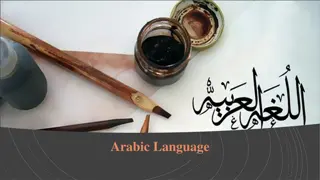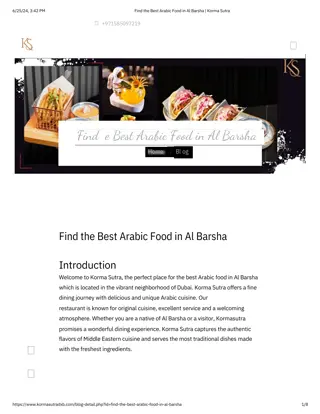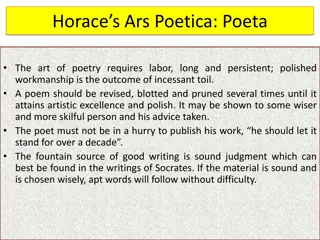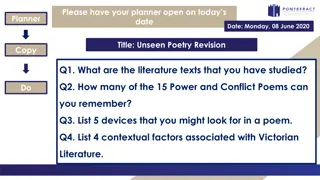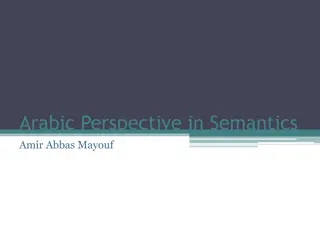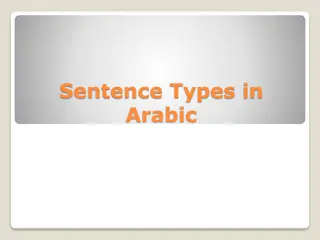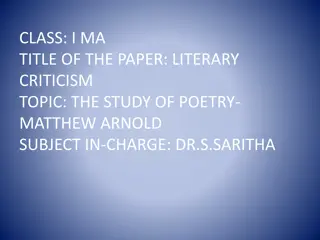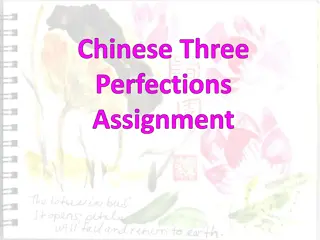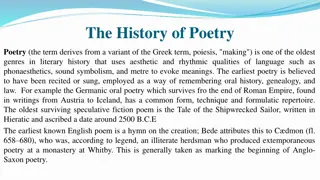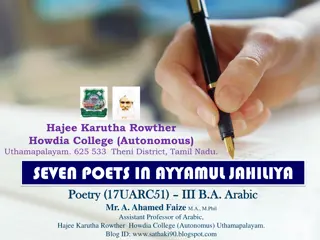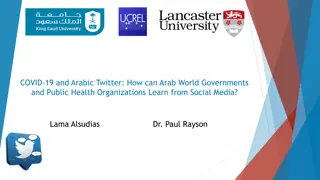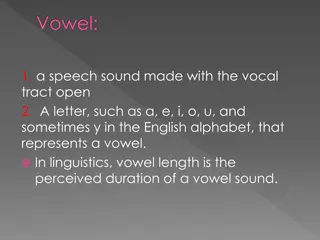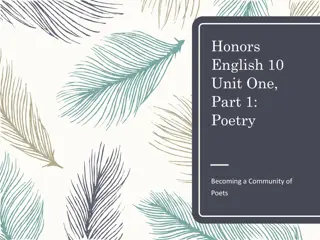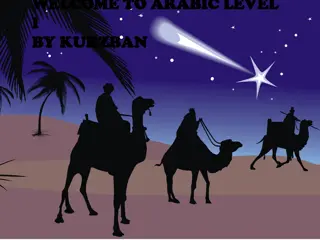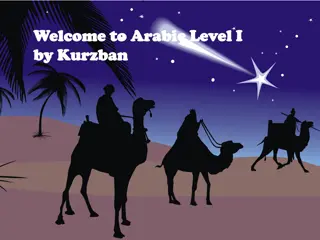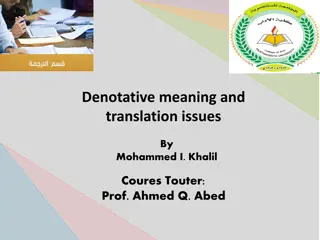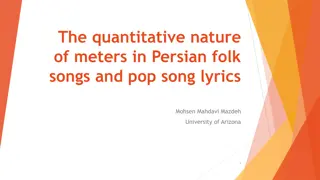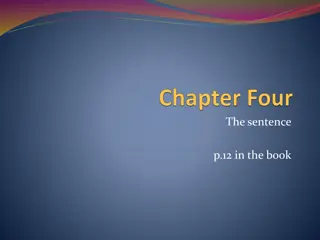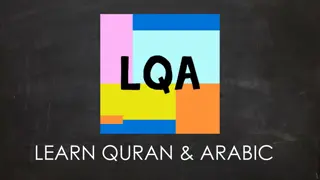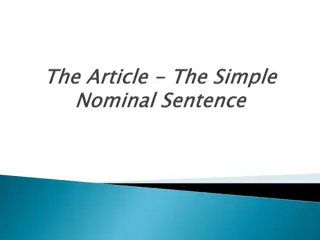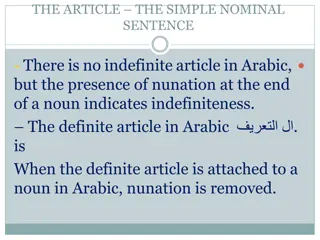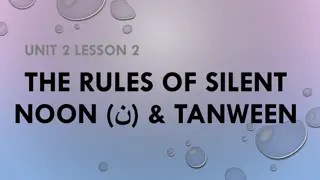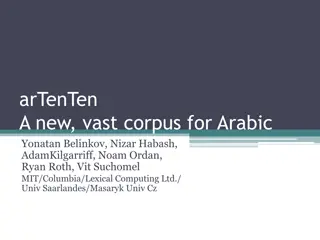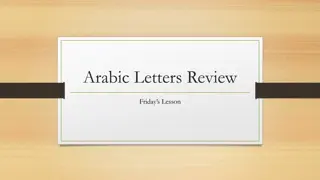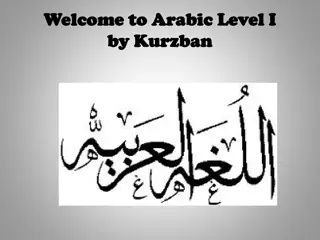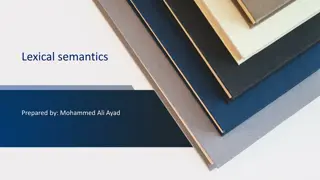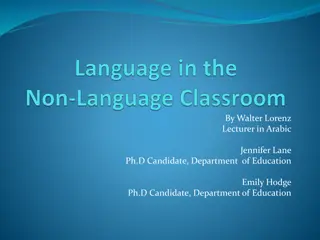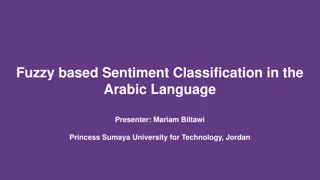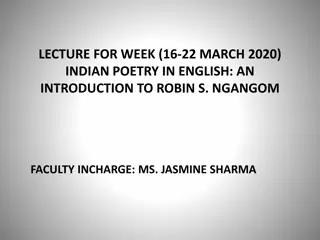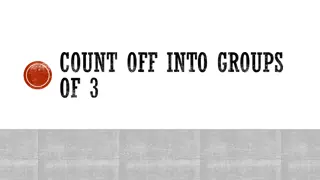Discovering the Rich History and Culture of the Arabic Language
Explore the roots and significance of the Arabic language, from its historical origins to its widespread use today among over 400 million native speakers. Dive into Arabic culture, known for its literature, art, music, and Islamic traditions. Learn about Arabic alphabets, key figures like Avicenna a
0 views • 6 slides
Find the Best Arabic Food in Al Barsha _ Korma Sutra
Welcome to Korma Sutra, the perfect place for the best Arabic food in Al Barsha which is located in the vibrant neighborhood of Dubai. Korma Sutra offers a fine dining journey with delicious and unique Arabic cuisine. Our restaurant is known for original cuisine, excellent service and a welcoming at
1 views • 3 slides
Overview of Poetry Genres and Elements for English Students
Explore different genres of poetry including narrative, epic, dramatic, satirical, elegy, fable, and prose poetry. Delve into the unique elements of poetry such as diction and figurative devices like simile and metaphor. Engage with various examples from renowned poets and learn about the aesthetic
1 views • 25 slides
Evolution of Modern Poetry in the 20th Century
Modern poetry in English emerged in the early 20th century as a reaction to Victorian formalism. Modernists drew inspiration from diverse literary traditions, including Greek, Chinese, and Japanese poetry, to create works that depicted social changes and the impact of World War I. Themes of material
1 views • 7 slides
Insights from Horace's Ars Poetica on the Art of Poetry
Horace's Ars Poetica, also known as The Art of Poetry, provides timeless insights into the craft of poetry. The text emphasizes the importance of labor, revision, and sound judgment in creating polished and enduring works. It discusses the poet's role as an observer of life, the balance between inst
0 views • 5 slides
Unseen Poetry Revision: Exploring Literary Texts, Devices, and Contexts
Delve into the world of unseen poetry revision by analyzing literary texts, exploring poetic devices, and understanding contextual factors associated with Victorian Literature. Engage in vocabulary challenges, pre-reading activities, and discussions to enhance your understanding of poetry. Enhance y
3 views • 24 slides
Exploring Arabic Semantics in Linguistics by Amir Abbas Mayouf
The article delves into the Arabic perspective in semantics as studied by linguists like Amir Abbas Mayouf. It discusses the definition of semantics, the difference between semantics and meaning, and the role of semantics in language sciences. The linguistic context, lexical reference, and phonetic
2 views • 15 slides
Understanding Sentence Types and Verbs in Arabic
Explore the two types of sentences in Arabic - nominal and verbal. Arabic verbs are typically derived from three-letter roots, conveying similar meanings. Discover the unique characteristics of Arabic tenses, emphasizing past, imperfect, and imperative forms.
0 views • 16 slides
Matthew Arnold's Literary Criticism: The Study of Poetry
Explore Matthew Arnold's approach to literary criticism focusing on the study of poetry. Arnold's work as a critic of literature, society, and religion is discussed, emphasizing his three estimates of poetry - the Real Estimate, the Historic Estimate, and the Personal Estimate. The Real Estimate hig
0 views • 9 slides
Exploration of 17th Century Literature: Themes, Poets, and Poetry Schools
The literature of the 17th century in London is characterized by melancholic themes, centered around notable figures like John Milton. The era saw the rise of two distinct schools of poetry - metaphysical and cavalier poetry. Metaphysical poets like John Donne employed unconventional metaphors and e
0 views • 5 slides
Exploring the Chinese Three Perfections: Poetry, Calligraphy, and Painting
Scholars from the Tang period through the Ming era in China highly esteemed the three perfections – poetry, calligraphy, and painting. Calligraphy, considered the highest art form, reveals a person's nature. Poetry, akin to painting with sound, was crucial during the Tang dynasty. Painting, often
3 views • 14 slides
A Journey Through the History and Elements of Poetry
Explore the rich history of poetry from ancient times to modern eras, delving into its evolution, forms, and significance. Discover the core elements of poetry and its distinctions from prose and drama. Uncover the genres, themes, and iconic works that have shaped the world of poetry as we know it t
1 views • 9 slides
Poetry Playground: A Journey Through Verses and Creativity
Delve into the enchanting world of poetry with Write Well Poetry Edition. Explore the art of crafting "I Am" poems, acrostics, and vibrant expressions. Uncover the simplicity of creating acrostics in five steps and embrace the beauty of poetic imagery. Discover poetry rules, captivating verses, and
1 views • 39 slides
Poetry and Poets of Ayyamul Jahiliya: Imru'al-Qais and Labd
Explore the rich heritage of Arabic poetry during the pre-Islamic era known as Al-Jahiliyya, focusing on the works of Imru'al-Qais and Labd. Immerse yourself in the captivating verses of Imru'al-Qais, considered a masterpiece of ancient Arabic literature, and delve into the life and poetry of Labd,
2 views • 13 slides
Leveraging Arabic Twitter for COVID-19 Insights
Governments and Public Health Organizations can harness the power of Arabic Twitter to extract valuable insights during the COVID-19 pandemic. By analyzing Arabic tweets, they can uncover topics of discussion, identify rumors, predict tweet sources, and update disease ontologies. Data collection spa
0 views • 20 slides
Exploration of Various Poetry Forms: Descriptive, Narrative, Dramatic, and Metaphysical
Poetry is a diverse art form encompassing descriptive portrayal, storytelling narratives, engaging dialogues, and profound metaphysical insights. Descriptive poetry vividly captures objects and scenes like paintings, narrative poetry weaves interconnected stories, dramatic poetry involves dialogues,
0 views • 11 slides
Coleridge's Cardinal Points of Poetry in Biographia Literaria
Coleridge's Chapter 14 in Biographia Literaria delves into the cardinal points of poetry, emphasizing the power to evoke reader sympathy through truth to nature and novelty through imaginative coloring. He discusses the difference between poetry and prose, highlighting the poet's role in crafting or
1 views • 37 slides
Understanding Vowels in English and Arabic
Explore the concept of vowels in English and Arabic languages, including their types, representation, and sounds. Discover the differences between short and long vowels, as well as the unique diphthongs present in Arabic. Learn about nunation and how it is used to indicate indefinite nouns and adjec
0 views • 14 slides
Explore the World of Poetry through Music and Empathy
Delve into the realm of poetry through the harmonious blend of music and empathy in the Honors English 10 Unit One, Part 1: Poetry Becoming a Community of Poets. Uncover the profound connection between lyrics and poetic expressions while discovering the power of empathy and support in the poetic jou
1 views • 131 slides
Arabic Level Lesson 15: Vocabulary Building and Translation Practice
This lesson focuses on vocabulary building and translation exercises in Arabic, reinforcing learning of words, phrases, and sentence structures. Students engage in activities like dictation, word translation, and practicing possessive pronouns in Arabic. The lesson aims to enhance language comprehen
0 views • 23 slides
Welcome to Arabic Level I Lesson 12: Building Your Vocabulary
In Lesson 12 of the Arabic Level I course, students focus on building their vocabulary by copying down and translating words multiple times. The lesson includes exercises on reviewing the Arabic alphabet and practicing identifying Arab countries, capitals, and cities. Students are encouraged to stre
0 views • 21 slides
AAPI Women Voices: Untold Stories Through Poetry Curriculum
Explore the empowering journey of AAPI women through poetry with the AAPI Women Voices curriculum. Delve into untold stories, reflect on performances, and discover the impact of poetry in shaping perspectives and voices. Engage in critical reflections, anticipate poetry's essence, and embrace the ar
0 views • 6 slides
Exploring Denotative Meaning and Translation Issues in Arabic Language
The article delves into denotative meaning, semantic repetition, synonym/near-synonym repetition, grammatical transposition, and semantic distancing techniques in Arabic language translation. It discusses how Arabic utilizes various forms of repetition and transposition that differ from English, sho
0 views • 15 slides
Exploring Quantitative Meters in Persian Folk Songs and Poetry
Delve into the quantitative nature of meters in Persian folk songs and pop song lyrics as discussed by Mohsen Mahdavi Mazdeh at the University of Arizona. The study explores how syllable weight, vowel length, and metrical patterns play vital roles in classical Persian poetry and the poetry of spoken
0 views • 19 slides
Understanding Sentence Patterns in English and Arabic
Explore the classification of sentences, elements, and patterns in English and Arabic languages. English sentences are categorized based on clauses, while Arabic sentences are classified by initial elements. Learn about the basic sentence patterns and the combination of elements in both languages.
0 views • 15 slides
Understanding Verbal Categories of Tense in English and Arabic
Verbs in English and Arabic exhibit tense distinctions with different forms denoting past and present time. English has two tenses - past and present, marked by suffixes, while Arabic has perfect and imperfect tenses marked by suffixes, prefixes, and internal vowel changes. Contrasts include English
0 views • 24 slides
Exploring Various Definitions of Poetry
Delve into the multifaceted nature of poetry through different perspectives such as poetry as a lie according to Plato, poetry as truth per Aristotle, poetry as prophecy as observed by T.S. Eliot, poetry as an expression of emotion according to Wordsworth and Mills, and poetry as substance as articu
0 views • 13 slides
Understanding Broken Plural in Arabic Grammar
Explore the concept of Broken Plural in Arabic grammar through this detailed content covering sound plural forms, patterns, and examples like Children, Geese, Teeth, Boys, Girls, Students. Gain insights into 3rd person female singular nouns, pronouns, pointers, and verbs in Broken Plural form. Disco
0 views • 21 slides
Understanding Arabic Grammar and Language Structure
In Arabic, there is no indefinite article, and the presence of nunation indicates indefiniteness. Adjectives come after nouns they qualify, and the adjective agrees with the noun in gender, number, and definiteness. The definite article "al" changes based on certain rules. Personal pronouns in Arabi
0 views • 13 slides
Understanding Arabic Grammar and Gender Rules
Arabic grammar rules include the use of definite and indefinite articles, placement of adjectives, and singular personal pronouns. Gender in Arabic is limited to masculine and feminine, with specific categories determining the gender of words. Learn more about these language features in Arabic.
0 views • 12 slides
Rules of Silent Noon and Tanween in Arabic Language
Learn about the rules of silent noon and tanween in Arabic language, including their pronunciation, position in words, and types of words in which they occur. Silent noon remains unchanged in writing and pronunciation, while tanween doesn't appear in writing when stopping. Understanding these rules
0 views • 5 slides
Introduction to arTenTen: A New Vast Corpus for Arabic Linguistic Processing
arTenTen is a new corpus for Arabic containing a vast array of text types, rich metadata, and clean linguistic processing capabilities. It offers a significant improvement over existing Arabic corpora, presenting a larger dataset with a variety of linguistic features. The corpus is fully processed,
0 views • 8 slides
Arabic Letters Review & Writing Tips for Beginners
Enhance your Arabic handwriting skills with this comprehensive guide featuring pronunciation tips and detailed instructions on writing Arabic letters. Explore the unique characteristics of one-way and two-way connectors, and learn how to write letters like Zay, Waw, Thal, Del, Alif, and Ra. Perfect
1 views • 25 slides
Learn Arabic Vowel System: Short, Long, Sukoon & Shadda
Dive into Lesson 4 of an Arabic Level I course by Kurzban, focusing on identifying short and long vowels, sukoon, and shadda symbols. Understand how vowels are represented in writing and practice pronunciation for a solid foundation in Arabic language learning.
0 views • 19 slides
Understanding Homonymy in Lexical Semantics: Examples from English and Arabic
Explore the concept of homonymy in lexical semantics through examples in both English and Arabic languages. Homonymy refers to words that share the same form but have unrelated meanings, leading to ambiguity in communication. Examples of homonyms in English and Arabic showcase how words can have mul
0 views • 27 slides
Exploring Hot Arabic Words in U.S. Media: Linguistic Roots and Misuse
This session delves into the use and misuse of popular Arabic words in U.S. media, analyzing their linguistic roots, daily usage, and the perspectives presented. Arabic's significance as the language of the Qur'an and its unique word structure are also highlighted.
0 views • 29 slides
Enhancing Arabic Search and Web Visibility for Libraries
Naseej offers innovative solutions for Arabic searching, indexing, and web visibility in libraries. By focusing on high recall and precision, Naseej Smart Arabic Processor and unique indexing techniques cater to the specific needs of Arabic language handling. The integration of Library Link Network
0 views • 10 slides
Enhancing Arabic Sentiment Analysis Using Fuzzy Logic Approach
Presenter Mariam Biltawi from Princess Sumaya University for Technology in Jordan discusses a research project on enhancing automatic polarity classification of Arabic text using a lexicon-based approach with fuzzy logic. The project utilizes a large-scale Arabic book reviews dataset and a sentiment
1 views • 30 slides
Exploring Indian Poetry in English through the Works of Robin S. Ngangom
This lecture delves into Indian Poetry in English, focusing on the experimental phase and introducing poet Robin S. Ngangom. It discusses the key features of Indian poetry in the experimental phase, social progress, and Ngangom's background, poetic style, and themes. The lecture sheds light on Ngang
0 views • 7 slides
Exploring Poetry: Definition, Analysis, and Appreciation
Delve into the world of poetry through discussions on what poems and poetry are, exploring dictionary definitions, famous quotes, and the transformative power of reading and analyzing poetry. Engage in group activities, examine the works of poets like Mina Loy and Mark Yakich, and discover the uniqu
0 views • 8 slides
